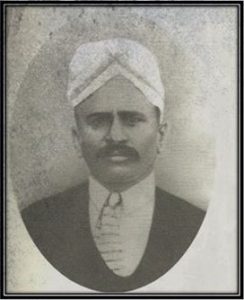Nadikerianda Chinnappa
Nadikerianda Chinnappa was born in 1875 in Karada,Kodagu. He had two elder brothers and two elder sisters, two younger sisters and one younger brother. He was an author, poet, translator, army man, police officer, cricket player, historian, singer and philanthropist.
Contents
Family
Father
Nadikerianda Aiyanna
Mother
Nadikerianda (Pattamada) Ponnavva
Wife
Nadikerianda Nanjavva
Children
Subbayya
Aiyanna
Bojamma
Gangamma
Muthamma
Akkamma
Family Tree
Education
He did his schooling in Central High School and First Year Arts from Mangalore. In college he was good at sports, Hockey and Cricket, and was brilliant in studies.
Career
- He joined the revenue department and became a Senebaayi (Shanbhog or Accountant) In 1899.
- He wrote an English poem, ‘My Position as Shanbog’, voicing his frustration with his job.
- He was a Revenue Inspector
- He joined the Coorg Regiment of the army and became a Subedar-Major in 1902.
- He joined the Police Department in 1904.
- After his training in Vellore he became a sub-Inspector in Kushalnagar and served in Napoklu, Srimangala and Virajpet for few years.
- He was made a Prosecuting sub-Inspector and was posted in Madikeri. and then he became a Prosecuting Inspector in Coorg.
- During his service in the Police Force he had to travel on horseback to the villages in the valleys and hills of Kodagu On duty he witnessed local festivals and listened to folk-songs that were a part of his culture. He feared that these traditions and songs that were handed down orally over the generations would in time be forgotten, because of the dominance of the English language, and influence of the cultures of the neighbouring areas.
- He got acquainted with several folk-singers and brought them home on his horse and fed them local toddy, he got them to sing the folk-songs they knew, as they beat the dudi while he transcribed the words of the songs, late into the night. By the year 1922 he had compiled many folk-songs and gathered enough material on the customs and traditions of Kodavas for his book, which he called the “Pattole Palame”.
Achievements
- ‘Pattole Palame’ was first published in 1924
- The second edition of ‘Pattole Palame’ (or ‘Silken Lore’), published by the University of Mysore in 1975, was described as one of the earliest, extensive collection of folklore of any Indian community written in an Indian language by an Indian.
- The fourth edition of the ‘Pattole Palame’ was published in 2002 by the Karnataka Kodava Sahitya Academy.
- Chinnappa’s translation of the Bhagwat Gita into Kodava thakk, called Bhagvathanda Patt, got published in 1929. This was written in the style of the Balopattu (Palame songs) and in a simple manner which could be understood by common people as well.
- He wrote a patriotic song in Kodava thakk ‘Sri Moola Kanniye’ (‘Primal Goddess’) in 1917. He called this Patriotic song as the ‘Swadesha Priya Keerthana’ and National Anthem. This song was dedicated to the Goddess Kaveri. This song was written during the pre-Independence age when the British Raj ruled over India.
- He was well-versed in both English and Kodava thakk and was chosen as the representative of the Kodava language In 1922, after narrating the Kodava thakk rendering of the biblical parable ‘Prodigal son’ he sang his own composition, the poem titled The Coorg national anthem:’ Swadēsi priya kirtane’ These gramophone recordings became part of the Linguistic Survey of India collection.
- A copy of his recordings were kept in the British Library’s ‘Sound Archives’ in London and in the Madras Museum. It was digitised by the Linguistics Department of the University of Chicago.
- He was also involved in establishing the Coorg Central Bank and the Coorg Education Fund.
- He sponsored the education of many poor and orphaned children in Kodagu.
- He played different sports regularly at the Victoria Club in Virajpet. He was a very good bowler and was a member of the All Coorg XI cricket team. He also played billiards and tennis at the Victoria Club.
A few months after his retirement from the Police service Chinnappa died of cancer, aged 56, on 12 September 1931.
Categories: Eminent People


Comments
Leave a comment!Login for Post Comment
Last posts